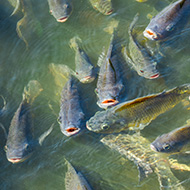
Researchers have developed an entire genome for Nile tilapia.
A collaboration between the Earlham Institute, WorldFish, and the Roslin Institute - part of the Royal (Dick) School of Veterinary Studies - has produced a “reference genome” for a key fish species that could improve food security for millions of the world’s poorest people.
According to researchers, the fundamental resource will help fish breeders develop strains of the popular type of farmed fish, Nile tilapia, which grow extremely large, very quickly and are resilient to the environmental challenges of global warming.
Using selective breeding without a complete reference genome, the Genetically Improved Farmed Tilapia (GIFT) programme, led by the research institution WorldFish (CGIAR), has produced an elite strain that is now available worldwide.
Dr Wilfried Haerty, study author and group leader at the Earlham Institute, explained: “A reference genome provides a full, annotated catalogue of all the genes in an organism. This crucial resource is the basis for modern breeding programmes. WorldFish, who are leading on further developments of GIFT, can now use the reference genome as the baseline to work from when looking to breed beneficial traits.”
Native to northern Africa, Nile tilapia is the most popular species used in aquaculture. With 4,514,615 t produced in 2020, it is the third most farmed finfish species worldwide, after grass carp and silver carp.
The GIFT strain was developed through a combination of commercial and wild Nile tilapia strains and crosses with other species. By examining the genomes of closely related species, researchers were able to show the degree to which genetic material may have been transferred across species in the past - and identify the specific regions in the GIFT genome.
Dr Diego Robledo, aquaculture genetics group leader at the Roslin Institute, said: “The insights offered by development of the entire genome of this key fish species will enable research towards ensuring sustainably produced supplies, to support a healthy source of nutrition for growing populations.”



 The RCVS has announced a new version of its 1CPD mobile app, with enhanced features for veterinary surgeons and veterinary nurses to record their continuing professional development.
The RCVS has announced a new version of its 1CPD mobile app, with enhanced features for veterinary surgeons and veterinary nurses to record their continuing professional development.